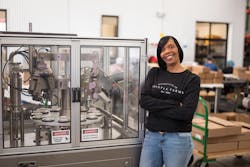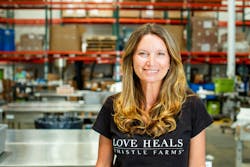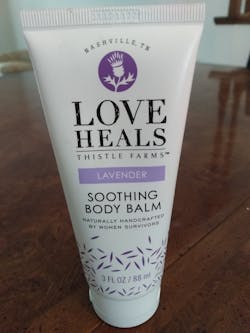Manufacturing Saves Women’s Lives in Nashville
Economic self-sufficiency is generally accepted as a precursor to a successful life. Finding that job or career that brings economic success can be difficult for many people. For women who have experienced human trafficking, prostitution and addiction, it’s all but impossible.
Impossible is not acceptable to Becca Stevens, founder of Thistle Farms in Nashville, Tennessee. She built her company, now 120 strong, based on the belief that if women who have suffered these experiences can find safe shelters and receive counseling, they would be able to find meaningful employment and be on the road to economic success.
And her organization has achieved that as 75% of the women who have completed the Thistle Farm program are living healthy, financially independent lives five years after graduation.
So, where does manufacturing fit in? It’s the means through which graduates of the program are employed.
First some background. Wanting to provide a sanctuary for women who face these conditions, Stevens opened a residential unit to safely house five women. Four years later the women, along with community volunteers, began making candles in a church basement on the campus of Vanderbilt University.
Today the manufacturing operation consists of a large facility that produces a natural body and home line sold through one brick-and-mortar store, whose volume is at $1 million. Additionally, products are sold through more than 400 retailers around the country, including Whole Foods.
“We started manufacturing once our volume increased from that single church location as a means to fulfill the justice enterprise model I created when I started Thistle Farms,” explains Stevens. “This structure is a subset of a social enterprise model where you start with a mission and then create a business. The women were the mission, the workforce was the business.”
In fact, Stevens didn’t hire an outside organization to manage its growth. “We grew the business alongside women survivors, FOR women survivors. We grew together.” However, the Nashville community was very important in its growth as well. “We were pleased by the generosity of the community that was willing to donate their services and offer their expertise so we could scale up our production.”
Of course, expertise was needed in specific areas, so some outside assistance was hired to help with inventory systems and manufacturing layouts.
Workforce Training
The name was chosen as “thistles grow on the streets and valleys where the women of Thistle Farms have walked,” as explained by the company’s website. “Considered weeds by many, thistles have a deep root that can shoot through concrete and survive drought. The resilience, vibrancy, and healing qualities of the thistle parallel the survival and flourishing of women survivors.”
This manufacturing workforce underwent a different type of training program than most manufacturing companies, prior to their employment. They completed a two-year program, free of charge, which includes housing, healthcare and counseling.
But once on the job they are provided training similar to other facilities on how to set up, take down and repair machines; make products and handle logistics. Given most of the employees don’t have manufacturing experience, they receive education both on-the-job and as well as completing GED programs, getting certifications and whatever training is necessary.
On a physical level, work is organized within the parameters of employees’ capabilities. For example, no one lifts more than 40 pounds by themselves and those with physical limitations are paired with other employees.
Culture
The culture is a bit different though. When I asked Stevens what I would find if I walked through this facility, she said “You’ll hear a lot of laughter, and feel the joy.” And true to her point, when I was taken on a virtual tour of the factory—a 22,000-square-foot facility in the heart of Nashville that opened in 2021—there was indeed a lot of laughter. And a lot of caring. As I toured the different stages of production, Stevens piped in to ask an employee how her physical rehab was going. As my virtual tour moved around the facility, I was greeted with a lot of pride, as employees said hello to me and showed me the processes they were working on.
One special point of pride was the newly acquired etching machine, which brings this function into the factory instead of being outsourced. “You are watching our new machine fill a custom candle order for California Closets,” said Ty Johnson, the manufacturing director, and her enthusiasm came through loud and clear.
This facility is a mixture of traditional manufacturing where employees are constantly being taught new procedures and processes, with a broader understanding of the larger picture of what this work means. “I have been here for 10 years and enjoy working hard to learn more and to support my son,” says Johnson.
Johnson came to the program from the prison system. “I’m truly grateful for this opportunity. I work hard for every raise, and I look forward to continuing to work hard. I like teaching people how the factory works, and this job enables me to do nice things for others as well as myself.”
Sourcing
Helping others is a standard operating procedure at Thistle Farms as its products, which fall under the categories of candles, body and essential oils, are sourced ethically. “We have a buyer and all of the necessary people to ensure that our supply chain is ethical and sustainable,” explains Stevens. “It’s so important that when we stamp Love Heals, our logo, on every product we are being mindful of who is producing the raw materials.”
In addition to what’s made in the factory, the company sources other product categories such as apparel and accessories from 36 global partners. “The products that we sell are created by small groups of women artisans who are also survivors of gender-based violence, trafficking, or extreme poverty,” says Stevens. Of the sale price, 60% goes back directly to these artisans.
And Stevens always has her eyes out for more products, and ways to help women, as evidenced by her recent trip to Poland to help refugees from Ukraine which led to a new line of artisan blankets. These blankets, as well as all other global products, are stored in the warehouse in the manufacturing facility and shipped from there.
A Growing Enterprise
In August of 2022, the company named a new CEO Tash Kennard, and the first CFO Scott Ryder to handle its growth.
Last year, the company hit $12 million from product sales and donations with around 40% from product sales and 60% from donations.
The 25-year-old company has grown every year and has had to move locations four times due to growth. The growth has come from product sales, including a line of holiday gifts as well as corporate gift kits. The company has received some “remarkable” gifts and grants as well.
“I don’t see us opening a second facility as we have space to expand at our current location,” says Stevens. “But we are open to the idea of someone in our sister communities, which produce raw materials for our products and are aligned with our mission, taking on a process or another product."
And Stevens is always open to ideas from the manufacturing community. “If anyone wants to come to our location and offer some best practices, we always appreciate it.” Donations of equipment, time and money are also welcome.
Manufacturing is essential to Thistle Farms as it’s the method through which women become financially independent and it’s also a way to educate society at large. “Our products carry the message that women do heal, and a community is safer when we invest in women. They don’t have to stay on the streets or in jail. Recovery and healing are possible,” says Stevens. The company’s mission is Heal, Empower and Employ. And how wonderful that it’s our industry that is employing these women.


